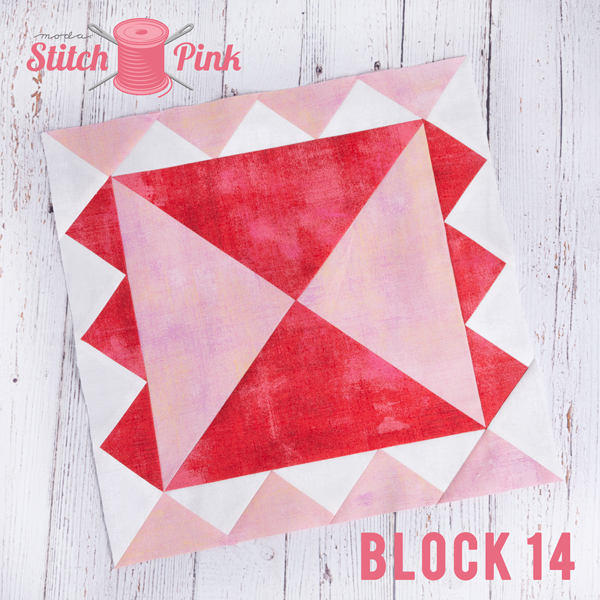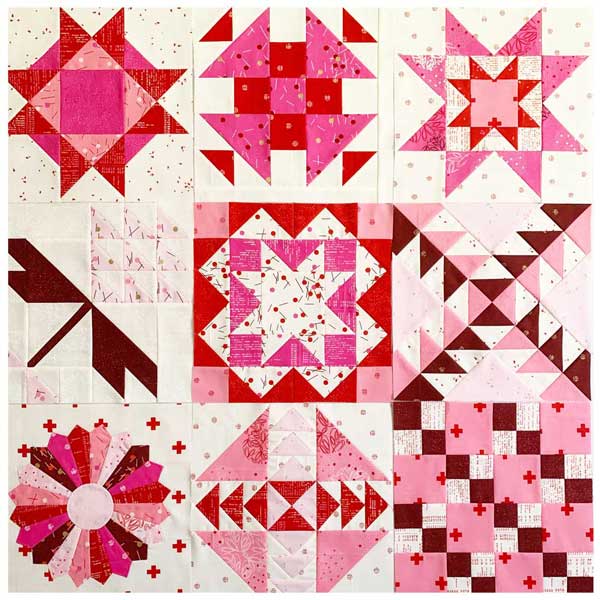Warehouses Closed June 6-13 For Exclusive Event
Stitch Pink Block 14
Stitch Pink Block 14
Can I tell you a secret? I don't remember why this block got this name, I only know that when I see it, it's "Mary".
I was asked recently if I could find out how this quilt came about, what was the thought process for the selection of blocks. Let me get to the block first.

Block instructions >> Block 14 - Along Comes Mary.
For this block, after making the center quarter-triangle square, pay careful attention to the seam allowance when joining the C and D triangles, for points, and for the length of the pieced strip.
Pressing. The pressing directions were accidentally omitted from Step 4. There are two options - the first is to press the seams to the triangles that will be on the outside edge. Doing so allows the seam junction on the inside point to be visible when it's joined to the center QTS. Press the seams open results in a less bulky seam. Choose the method that works for you, just be careful not to stretch the pieced unit. (Been there, done that.)

These are the first nine blocks by Carrie Straka of Red Velvet Quilts. She's using Just Red by Zen Chic.
Now about the sampler.
When I wrote patterns years ago, I loved the challenge of trying to make a quilt that was different from what I'd already done. As soon as there were a few quilts in the works, I would look at them collectively for similarity. How many had the same kind of border? Did four of the five have a diagonal setting? If what we make is a reflection of who we are, then I hope my quilts show that I will always look for a "road less traveled."
So when it came to drawing up a sampler quilt, I had a few criteria - self-chosen. (Shocker? Not.) There had to be a mix of easy and challenging blocks. They couldn't all have the same grid-balance - 3x3, 4x4 and so on. (E.g., A nine-patch is a 3x3 grid and a sawtooth star is a 4x4.) They couldn't all have triangles - most of my favorite blocks have them. And it had to have a bit of an "orphan block" feel to it. It also had to be a straight setting.
If you're wondering why all the rules, I've found that having limitations is creatively challenging. It forces me to think of options - to figure out how to make something work.
I used to draw quilts with a pencil and paper, now I use InDesign. While it's not a drawing program, it works for what I need. (I wish I was proficient with Illustrator, but I'll climb that mountain some other day.) After going through a stack of block books for ideas, I drew a dozen or so blocks, some of which aren't in the finished quilt. Starting in the upper-left corner, blocks were put into place to get an idea of what else was needed. What was missing? Did the placement have balance? You should know I always work with shaded blocks, never with color. Not because that's the right way to do it, but because it's what works for me.
If I were to do this over, are there blocks I would change? Maybe. Probably. Not because it needs to be perfect, but perhaps it might be better. I like that part of the process.
Excellence is the gradual result of always striving to do better. Pat Riley
Sharing blocks? We're doing that on Facebook and Instagram.
Is there a hashtag? Yes! #ModaStitchPink. (We hope you'll share a block or two there.)
Is there an Archive? There is! It's here - Stitch Pink Archive.
That's it for Day 14 of Stitch Pink.

Comments